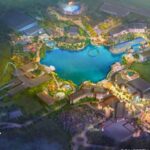In the wave of global sustainable development, an innovative agricultural model is quietly emerging: wetland agriculture, which skillfully integrates ecological conservation with agricultural production. Today, wetland agriculture has demonstrated unique appeal and great potential worldwide, opening a new path for balancing agricultural development and environmental protection.
Wetlands: The Kidneys of the Earth Breeding Specialized Agriculture
Wetlands, one of the Earth’s three major ecosystems alongside forests and oceans, are known as the “kidneys of the Earth.” They play vital ecological roles such as conserving water resources, purifying water quality, regulating floods, and maintaining biodiversity. At the same time, wetlands provide exceptional conditions and resources for agricultural activities. Wetland agriculture, a specialized agricultural form derived from these natural features, has received increasing attention in recent years.
The Florida Everglades, USA: A Model of Sustainable Fisheries and Fruit-Vegetable Farming
In the Florida Everglades, local communities have developed sustainable fisheries and specialty fruit and vegetable farming while strictly adhering to wetland protection regulations. Farmers fully utilize the region’s abundant water and unique soil conditions to grow water-tolerant vegetables and specialty fruits that supply surrounding cities. At the same time, fishing is strictly regulated to ensure ecological balance and stable agricultural output. Compared with conventional agriculture, this model has improved output stability by about 20%, while ecological indicators have continued to improve.
In the practice of crop cultivation, farmers use advanced irrigation techniques that combine drip irrigation with rainwater harvesting. Drip systems deliver water and nutrients directly to the plant roots, avoiding waste, while rainwater collection systems store excess water during the rainy season for use in drier periods, significantly improving water-use efficiency. In the fisheries sector, marine reserves have been established with designated fishing bans by area and season, giving fish populations sufficient time and space to reproduce and grow. For instance, after several years of such policies, grouper populations have rebounded significantly, and fishermen have seen stable, long-term gains.
Camargue, France: Traditional Rice Farming Revitalized
In the Camargue region of southern France, farmers have established a distinctive wetland rice cultivation system. Thanks to nutrient-rich wetland soils, high-quality rice is grown using unique water management techniques that also preserve critical habitats for migratory birds. This fusion of tradition and innovation has protected wetland ecosystems while delivering substantial economic benefits. Today, Camargue is a popular tourist destination that draws visitors to experience its distinctive agricultural culture and natural beauty.
Farmers in the Camargue follow traditional crop rotation methods, alternating rice with green manure crops like Chinese milk vetch. The plant enriches soil fertility through nitrogen fixation, reducing the need for chemical fertilizers and maintaining soil health. The terrain is also cleverly utilized to create natural irrigation and drainage systems: excess rainwater during the wet season flows into nearby water bodies, while sluice gates regulate water flow from the wetlands during dry seasons to irrigate rice fields. This eco-friendly farming model produces Camargue aromatic rice, which commands 30%–50% higher prices in Europe’s premium markets due to its distinctive flavor. During the migratory bird season, tourism flourishes, boosting the local hospitality and food industries. Tourism now contributes around 25% of the local economy.
Pantanal, South America: A Rising Model of Integrated Wetland Agriculture
Spanning Brazil, Bolivia, and Paraguay, the Pantanal wetlands are embracing sustainable ranching and aquaculture under eco-conscious principles. The region is rich in wetland grasses, and ranchers carefully manage grazing intensity to prevent overgrazing. Grazing, in turn, helps preserve grassland structure and promotes plant growth. Some local communities are also exploring aquaculture in these wetlands, raising fish and shrimp using clean natural waters and aquatic resources. This integrated approach helps protect the vast Pantanal ecosystem while creating new income streams for farmers and herders.
Ranchers in the Pantanal use new technology such as smart tracking devices to monitor livestock locations and activity in real-time, allowing them to rationally plan grazing zones and avoid overgrazing in specific areas. Aquaculture practices follow an ecological approach, with aquatic plants grown around ponds to absorb excess nutrients, purify the water, and provide natural shelter for fish and shrimp. The result is high-quality aquatic products, some of which are exported to European and American markets, generating substantial foreign income. Since adopting integrated wetland agriculture, the average annual income of residents has increased by about 30%.

Technology Empowerment: Precision Agriculture Supports Wetland Farming
The rise of wetland agriculture is closely tied to technological advancement. Many regions have introduced precision agriculture techniques to control irrigation and fertilization in wetland farmlands, minimizing resource waste and reducing ecological disruption. Real-time monitoring of soil moisture and nutrient levels using sensors enables automated adjustments to water and fertilizer delivery. This approach enhances crop yields while preserving the wetland ecosystem. According to a report by the International Society for Precision Agriculture, these technologies have effectively boosted both productivity and ecological benefits in wetland agriculture.
Challenges and Solutions: Safeguarding the Sustainable Future of Wetland Agriculture
Despite its promising outlook, wetland agriculture faces several challenges. Global climate change has led to more frequent extreme weather events, such as heavy rains and droughts, threatening production stability. Urbanization continues to shrink wetland areas, restricting the scope for sustainable agricultural development.
In response, countries are taking proactive measures. Florida has strengthened wetland protection laws, strictly limiting development encroachment. The Camargue region of France has partnered with research institutions to develop climate-resilient rice varieties. In South America, the Wetlands Conservation Alliance is fostering regional cooperation to formulate coordinated development plans for wetland agriculture, with a focus on ecological protection and restoration.
Experts emphasize that the future of wetland agriculture lies in deepening the integration of ecological conservation with agricultural innovation. Continuous exploration of new models and increased investment in green and intelligent technologies are essential. As awareness of environmental protection and sustainability continues to grow, wetland agriculture is poised to become a vital direction for global agricultural development, offering greater ecological and economic benefits for humanity.












